

I Am Not Doing a Genealogy Do-Over. Thomas MacEntee wrote Announcing the Genealogy Do-Over on the Geneabloggers blog recently.
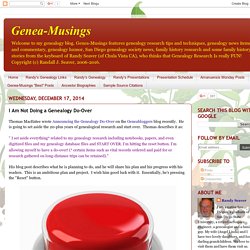
He is going to set aside the 20-plus years of genealogical research and start over. Thomas describes it as: " I set aside everything* related to my genealogy research including notebooks, papers, and even digitized files and my genealogy database files and START OVER. The Genealogy Do-Over: 2016 Topics - GeneaBloggersGeneaBloggers. The Genealogy Do-Over started in January 2015 as a weekly program lasting 13-weeks.
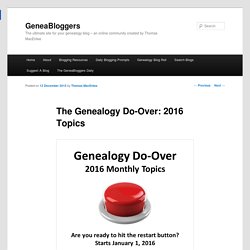
Genealogy Articles. Here is a brief list of articles and guests posts written for various venues or that have been written about High-Definition Genealogy and/or Thomas MacEntee.
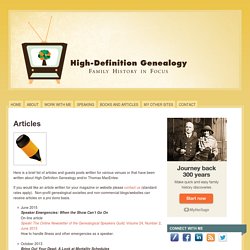
If you would like an article written for your magazine or website please contact us (standard rates apply). Non-profit genealogical societies and non-commercial blogs/websites can receive articles on a pro bono basis. UK to Canada Genealogy. Canadian Census Tips from Denise Larson - GenealogyandFamilyHistory.com. The following post is from author, Denise Larson, who has offered her expertise on other topics such as Maine Genealogy in two parts, as well as the recently posted piece about Canada’s upcoming anniversaries.
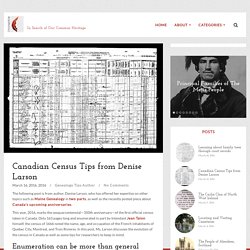
This year, 2016, marks the sesquarcentennial—350th anniversary—of the first official census taken in Canada. Only 163 pages long and enumerated in part by Intendant Jean Talon himself, the census of 1666 noted the name, age, and occupation of the French inhabitants of Quebec City, Montreal, and Trois Rivieres. In this post, Ms. Larson discusses the evolution of the census in Canada as well as some tips for researchers to keep in mind. From that simple start in 1666, census taking in Canada expanded to Acadia in 1671. Some enumerations were very specific to a certain civil or religious group. Library and Archives Canada offers a list of extant Canadian censuses on its website at The page lists the years of census returns, a finding aid, and searchable databases. Articles - Web Genealogist. Is Your Family History Done?
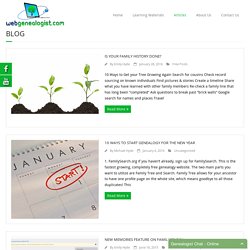
10 Ways to Get your Tree Growing Again Search for cousins Check record sourcing on known individuals Find pictures & stories Create a timeline Share what you have learned with other family members Re-check a family line that has long been “completed” Ask questions to break past “brick walls” Google search for names and places Travel Read More 10 Ways to Start Genealogy for the New Year 1. FamilySearch.org If you haven’t already, sign up for FamilySearch. Is Your Family History Done? - Web Genealogist. Search for cousinsCheck record sourcing on known individualsFind pictures & storiesCreate a timelineShare what you have learned with other family membersRe-check a family line that has long been “completed”Ask questions to break past “brick walls”Google search for names and placesTravel to the location your ancestors are fromCheck again, the answer might be there this time Many times as I talk to people about my passion for genealogy, I often hear, “Oh, my family history is all done.
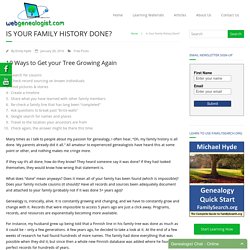
My parents already did it all.” Adventures in Genealogy Education: Studying the Genealogical Proof Standard. I am going to start my new series on "Educational Preparation for BCG Certification" by saying that these posts are not just for those interested in certification.
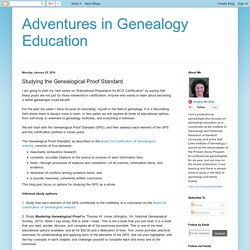
Anyone who wants to learn about becoming a better genealogist could benefit.For the past ten years I have focused on educating myself in the field of genealogy. It is a fascinating field where there is always more to learn. This blog post focus on options for studying the GPS as a whole.Informal study options: 2. Study Mastering Genealogical Proof by Thomas W. 3. Bringing family history to life. How much of your life will be remembered by your descendants?
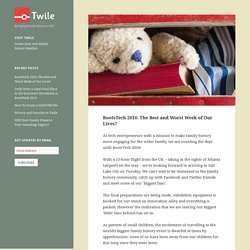
The death of a relative can often bring to mind all of the questions we wished we’d asked before it was too late. Why didn’t we ask them more about their life? Why didn’t we pay attention when they tried to tell us their story? Once they’re gone, we will dig through boxes of photos they’ve left behind, maybe find diaries that we didn’t know existed. For some it may generate a new (or renewed) interest in their family history, but no amount of research can uncover a person’s full story. I think about this a lot. Blog - Treasure Chest of Memories. The Genealogy Assistant.
Family history research & musings. Top Ten Genealogy/Family History Books by a Self-Confessed Bookworm. “Tsundoku” – the Japanese word for buying books and letting them pile up unread.
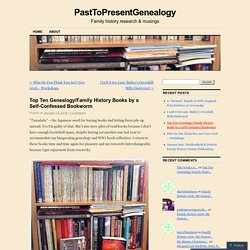
How To Build Your Digital Library. After my recent post about buying a printed copy of a Google Book, several people had questions about digital books and how to use them.
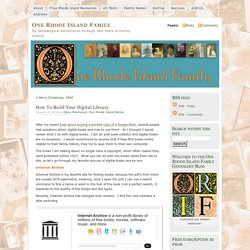
So I thought I would review what I do with digital books. I am an avid book collector and digital books are no exception. I would recommend to anyone that if they find books online related to their family history, they try to save them to their own computer. The books I am talking about no longer have a copyright, which often means they were published before 1923. MICHIGAN FAMILY TRAILS : STEVE MORSE’S ONE-STEP WEBSITE ~ If you thought it was only for passenger records–Think again! When I began doing family research I tried to learn as much as I could. One of the first things I remember hearing about was Steve Morse’s One Step site for finding passenger records. The site combined the records from Ellis Island and Castle Garden, making searching easier. Oh, how this webite has changed over the years. Passenger lists, not just from Ellis Island and Castle Garden, but Baltimore, Boston, Philadelphia and moreShips lists and photosCensus information including images, ED finders, maps and moreSome Canadian and UK census recordsNew York Census recordsSome vital recordsAll kinds of calendar conversions, zip codes, area codes etc.Foreign Alphabet translationsDNA informaton, publications and moreLet me show you one example of how this site can help you.
Millions of Free Records on FamilySearch Can Not Be Found via Search: Here's How to Access Them. It’s an often overlooked fact that a vast amount of FamilySearch’s collections cannot be found via the search on their site. Millions of free family history records are waiting to be discovered but have not yet been indexed and are, therefore, somewhat hard to find. These records are invaluable tools for genealogists and cover a wide range of locales and time periods so we thought we’d offer a quick rundown on how to access them. But first a note about searching collections individually. One of the most commonly overlooked tactics for successfully locating ancestors in online databases is to search collections individually.
It’s natural to want to check a site’s entire database with one quick search–and many places do make this incredibly easy and quite accurate–but the truth is, no search function is perfect. Luckily, FamilySearch makes the process pretty painless. The Ins and Outs of Social Media for Genealogists - The In-Depth Genealogist.
Social media is hard to define, or even describe to most people. It is ever changing and almost fluid in the way it has evolved over the past decade. Essentially, this concept refers to a community based, online communication forum which relies heavily on sharing of content and collaboration. Genealogists can use social media in several ways. For example, research, networking, or education are ways we can connect, share, and collaborate using various platforms. Social media and genealogy can go hand in hand with each other very easily. Some love Twitter, while others detest it.
Where do you think you fall on the social media usage scale? Remember, social media outlets will only work for you if you participate in them. Below is a list of some of the more popular and frequently used social media platforms. CanadaGenealogy, or, 'Jane's Your Aunt' CanadaGenealogy, or, 'Jane's Your Aunt' Librarians Helping Canadian Genealogists Climb Family Trees. How to Read Old Handwriting. You can train yourself to read old handwriting. This is a necessary skill if you want to read handwritten census records or any type of record that was produced before the wide-spread use of the typewriter in the 1920s.
This article lists the best free online resources and tutorials to help get you started. Palaeography is the study of old handwriting. At some point, every genealogist comes across an old handwritten record of their ancestor, looks at it and pronounces it totally illegible. It is not necessarily illegible; it just might seem illegible to the modern eye. 7 Prompts to Help You Write Your Family History. The biggest obstacle to writing family history can be getting started. Try one of these prompts to jump-start past the opening paragraph – then join me for my workshop! Have you ever started to write a family history narrative, only to get stuck on the opening paragraph? “Charles John Andrews was born on….” You rattle off dates and parents’ names. Then you realize you’ve bored yourself in the very first paragraph. Lisa Louise Cooke: Using Google tools for genealogy. Grow Your Genealogy Skills-One Tip at a Time From Genealogist Michael John Neill.
Rejoice, and be exceeding glad...: List of LDS Family History Related Blogs. Rejoice, and be exceeding glad...: Putting the Historical Record Collections in Focus. This last week or so I was asked to help a patron at the Brigham Young University Family History Library with research into her Italian ancestors. After a short review of the status of her family research, we began by searching the FamilySearch.org Catalog for the place where her ancestors lived. The British GENES blog. AncestralFindings.com — Free Genealogy Lookups. Journey to the Past. The Family Curator - Family Curator. Eastman's Online Genealogy Newsletter. GenealogyBlog. A genealogy news blog from a Montréal, Québec point de vue.
Genealogy Insider. "Who Do You Think You Are? ": J.K.